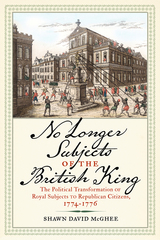7 start with I start with I
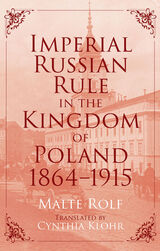
After crushing the Polish Uprising in 1863–1864, Russia established a new system of administration and control. Imperial Russian Rule in the Kingdom of Poland, 1864–1915 investigates in detail the imperial bureaucracy’s highly variable relationship with Polish society over the next half century. It portrays the personnel and policies of Russian domination and describes the numerous layers of conflict and cooperation between the Tsarist officialdom and the local population. Presenting case studies of both modes of conflict and cooperation, Malte Rolf replaces the old, unambiguous “freedom-loving Poles vs. oppressive Russians” narrative with a more nuanced account and does justice to the complexity and diversity of encounters among Poles, Jews, and Russians in this contested geopolitical space. At the same time, he highlights the process of “provincializing the center,” the process by which the erosion of imperial rule in the Polish Kingdom facilitated the demise of the Romanov dynasty itself.
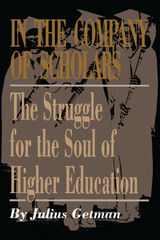
"I began this book to articulate my sense of disappointment and alienation from the status I had fought so hard to achieve." A remarkable admission from an alumnus of Harvard Law School who has held tenured professorships in the law schools of Yale and Stanford and has taught in the law schools of Harvard and Chicago.
In this personal reflection on the status of higher education, Julius Getman probes the tensions between status and meaning, elitism and egalitarianism, that challenge the academy and academics today. He shows how higher education creates a shared intellectual community among people of varied races and classes—while simultaneously dividing people on the basis of education and status.
In the course of his explorations, Getman touches on many of the most current issues in higher education today, including the conflict between teaching and research, challenges to academic freedom, the struggle over multiculturalism, and the impact of minority and feminist activism. Getman presents these issues through relevant, often humorous anecdotes, using his own and others' experiences in coping with the constantly changing academic landscape.
Written from a liberal perspective, the book offers another side of the story told in such works as Allan Bloom's The Closing of the American Mind and Roger Kimball's Tenured Radicals.
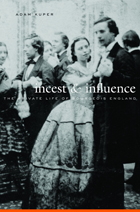
Like many gentlemen of his time, Charles Darwin married his first cousin. In fact, marriages between close relatives were commonplace in nineteenth-century England, and Adam Kuper argues that they played a crucial role in the rise of the bourgeoisie.
Incest and Influence shows us just how the political networks of the eighteenth-century aristocracy were succeeded by hundreds of in-married bourgeois clans—in finance and industry, in local and national politics, in the church, and in intellectual life. In a richly detailed narrative, Kuper deploys his expertise as an anthropologist to analyze kin marriages among the Darwins and Wedgwoods, in Quaker and Jewish banking families, and in the Clapham Sect and their descendants over four generations, ending with a revealing account of the Bloomsbury Group, the most eccentric product of English bourgeois endogamy.
These marriage strategies were the staple of novels, and contemporaries were obsessed with them. But there were concerns. Ideas about incest were in flux as theological doctrines were challenged. For forty years Victorian parliaments debated whether a man could marry his deceased wife’s sister. Cousin marriage troubled scientists, including Charles Darwin and his cousin Francis Galton, provoking revolutionary ideas about breeding and heredity.
This groundbreaking study brings out the connection between private lives, public fortunes, and the history of imperial Britain.

The occupation of the northern half of the Chinese territories in the 1120s brought about a transformation in political communication in the south that had lasting implications for imperial Chinese history. By the late eleventh century, the Song court no longer dominated the production of information about itself and its territories. Song literati gradually consolidated their position as producers, users, and discussants of court gazettes, official records, archival compilations, dynastic histories, military geographies, and maps. This development altered the relationship between court and literati in political communication for the remainder of the imperial period. Based on a close reading of reader responses to official records and derivatives and on a mapping of literati networks, the author further proposes that the twelfth-century geopolitical crisis resulted in a lasting literati preference for imperial restoration and unified rule.
Hilde De Weerdt makes an important intervention in cultural and intellectual history by examining censorship and publicity together. In addition, she reorients the debate about the social transformation and local turn of imperial Chinese elites by treating the formation of localist strategies and empire-focused political identities as parallel rather than opposite trends.
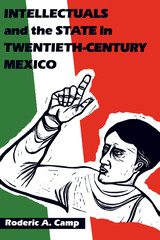
In developing countries, the extent to which intellectuals disengage themselves in state activities has widespread consequences for the social, political, and economic development of those societies. Roderic Camps’ examination of intellectuals in Mexico is the first study of a Latin American country to detail the structure of intellectual life, rather than merely considering intellectual ideas. Camp has used original sources, including extensive interviews, to provide new data about the evolution of leading Mexican intellectuals and their relationship to politics and politicians since 1920.
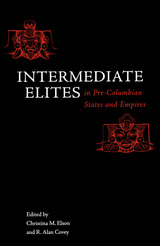
This is the first volume to consider how individuals subordinate to imperial rulers helped to shape specific forms of state and imperial organization. Taking a broader scope than previous studies, it is one of the few works to systematically address these issues in both Mesoamerica and the Central Andes. It considers how these individuals influenced the long-term development of the largest civilizations of the ancient Americas, opening a new window on the role of intermediate elites in the rise and fall of ancient states and empires worldwide.
The authors demonstrate how such evidence as settlement patterns, architecture, decorative items, and burial patterns reflect the roles of intermediate elites in their respective societies, arguing that they were influential actors whose interests were highly significant in shaping the specific forms of state and imperial organization. Their emphasis on provincial elites particularly shifts examination of early states away from royal capitals and imperial courts, explaining how local elites and royal bureaucrats had significant impact on the development and organization of premodern states.
Together, these papers demonstrate that intricate networks of intermediate elites bound these ancient societies together—and that competition between individuals and groups contributed to their decline and eventual collapse. By addressing current theoretical concerns with agency, resistance to state domination, and the co-option of local leadership by imperial administrators, it offers valuable new insight into the utility of studying intermediate elites.

Weaving together ethnography, archival research, and cultural history, Bobrow-Strain argues that prior to the upheavals of 1994 landowners were already squeezed between increasingly organized indigenous activism and declining political and economic support from the Mexican state. He demonstrates that indigenous mobilizations that began in 1994 challenged not just the economy of estate agriculture but also landowners’ understandings of progress, masculinity, ethnicity, and indigenous docility. By scrutinizing the elites’ responses to land invasions in relation to the cultural politics of race, class, and gender, Bobrow-Strain provides timely insights into policy debates surrounding the recent global resurgence of peasant land reform movements. At the same time, he rethinks key theoretical frameworks that have long guided the study of agrarian politics by engaging political economy and critical human geography’s insights into the production of space. Describing how a carefully defended world of racial privilege, political dominance, and landed monopoly came unglued, Intimate Enemies is a remarkable account of how power works in the countryside.
READERS
Browse our collection.
PUBLISHERS
See BiblioVault's publisher services.
STUDENT SERVICES
Files for college accessibility offices.
UChicago Accessibility Resources
home | accessibility | search | about | contact us
BiblioVault ® 2001 - 2024
The University of Chicago Press






